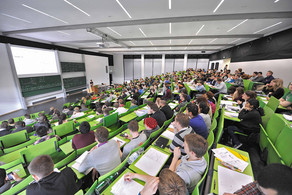Thesis defense of Jordi Folch Eguren
- Defense
In this thesis we explore two complementary extensions of the Standard Model, corresponding to a light new physics scenario featuring a (dark) vector boson, and a heavy new physics scenario involving a scalar leptoquark. Focusing on their flavour-changing interactions and observables, which provide highly sensitive probes of physics beyond the Standard Model, we employ the framework of effective field theory to systematically analyse both setups. In the first part of this thesis, we provide an overview of the Standard Model, flavour and effective field theories. In the second part, we study the light dark vector boson model. We focus on flavour violating interactions between the new vector and the Standard Model fermions, and analyse how such interactions can arise from the Yukawa diagonalisation and the renormalisation group equations at 1-loop. Then, we use experimental data and our theory calculation from two-body decays to set constraints on the model parameters. Furthermore, we also use the tool of perturbative unitarity to set bounds on the model. In the third part, we consider scalar leptoquarks, corresponding to a heavy new physics model. Here, we compute the Wilson coefficients to order $\mathcal{O}(\alpha_s)$ for $\Delta F=2$ processes from matching the effective and full theories, which involves the calculation of 1-loop amplitudes in the effective theory and 2-loop in the full theory. Finally, we analyse the 1-loop corrections to the effective theory for $\Delta F=1$ processes. We focus on a particular computational procedure involving Dirac traces, which requires a careful examination of the Dirac algebra in different $\gamma_5$ schemes, and extract results in a general gauge and for different IR regulators.









